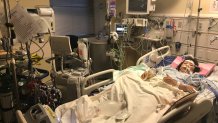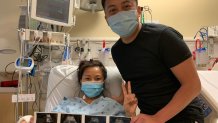Maria Vang was 17 weeks pregnant with her first baby when the unexpected happened. Her heart failed.
A team of medical professionals at Kaiser Permanente Santa Clara Medical Center rushed to her aid, hooked her up to a specialized machine and saved her life. Following a successful recovery, Vang gave birth to baby Jensen at full-term earlier this week.
"He's a blessing for sure," Vang, a 36-year-old Sacramento resident, said Thursday as she sat with her husband and their new addition at the hospital.
Back in September, Vang complained about having trouble breathing and sleeping. As it turns out, she was seriously ill.
"She was pretty sick," Dr. Richard Ha, chief of cardiac surgery at Kaiser Santa Clara, said. "She came from our Kaiser Sacramento program. She was brought here because she was in acute heart failure. Her heart was functioning at about 20%. Normally, people function at 65%."
Vang was given medications, which helped a bit, but her condition continued to worsen over time.
Local
Ha said Vang had myocarditis, or inflammation of the heart, which eventually led to her heart failure.
"We got a call that she was doing poorly," Ha said. "Then she started coding. Her heart kind of gave out on her."
Get a weekly recap of the latest San Francisco Bay Area housing news. Sign up for NBC Bay Area’s Housing Deconstructed newsletter.
Vang's husband, Sulei Yang, said watching his wife in the hospital was "like facing death."
"Right in front of death's face," he said. "My mind went blank for quite some time. I had to like come to my sense and know what's happening. It was scary. It made you think about life twice."

After CPR was performed, doctors hooked Vang up to an extracorporeal membrane oxygenation (ECMO) machine, which pumps blood throughout the body.
"What's amazing about this thing is that it replaces the function of the heart," Ha said. "And what's amazing is that we did it on a Sunday and everybody coming from home so fast."
Vang's condition gradually improved and doctors were able to take her off the ECMO machine.
"I've done this quite a bit in my past and in my past I have not seen somebody this early in their pregnancy survive – 17-week pregnancy going on this device," Ha said. "She survived and she flew. She did great."

Vang was allowed to go home in October and continue prepping for the arrival of her baby. She returned to Kaiser Santa Clara this week to deliver Jensen, who arrived after a short labor early Wednesday morning, Megan Gillespie, chief nurse executive at Kaiser Santa Clara, said.
"Watching this miracle come to fruition was really like watching all of our team come together like a beautiful symphony orchestra," Gillespie said. "It took so many different parts and unique experts and specialties."
A grateful Vang was wheeled out of the hospital Thursday, ready to get back to a normal life.
"I feel fine," she said. "I'm ready to get out of here."



